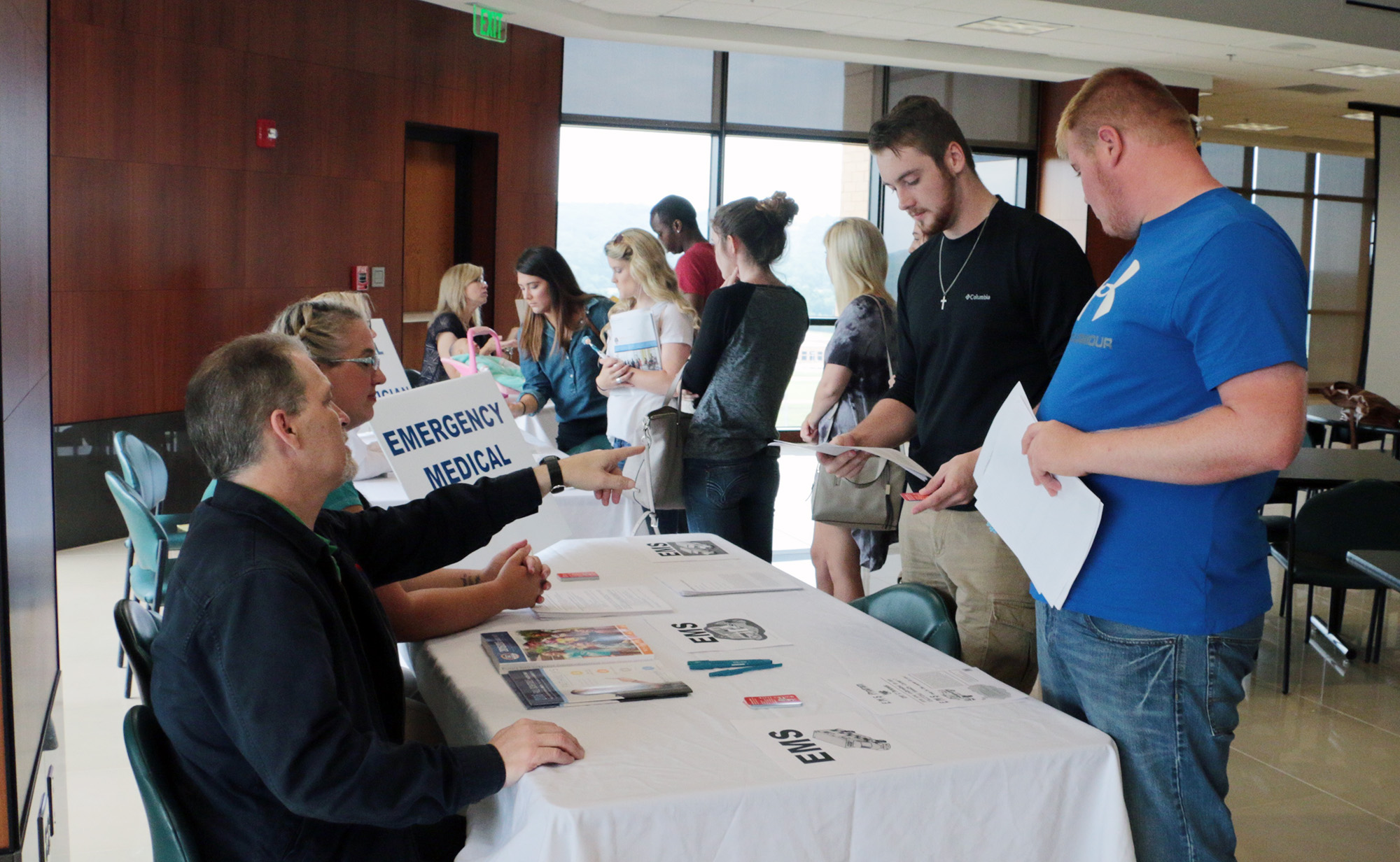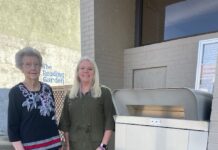HANCEVILLE – Though they did not get into their first-choice programs in Wallace State Community College’s Health Division, more than 40 students took advantage of the Second Opportunity event hosted this week to find out about other options open to them for Fall 2016.
“Some of our programs are highly selective, we have 30 or 40 slots and we may 120 to 140 people that apply,” said Lisa German, dean of the Health Division. “But we do have some alternatives that still exist for this fall semester.”
Wallace State Community College offers 19 different health programs, the most of any other community college in the state. German gave a synopsis of the programs that still have openings for the fall semester and pointed out some of the characteristics that might make particular programs a good fit for certain people.
Child Development
“Child Development is an area that is really changing in our state right now,” German said. “The goal is by 2020 to have optional 4-year-old Pre-K available to all students in the state. It’s actually a big initiative in Alabama. With that, they’ve mandated education requirements for those folks who are working in those Pre-K programs.”
Wallace State’s Child Development program offers certificates and associate degree options, and all of the courses are offered online. The program is geared toward individuals who want to work in day cares and head start and Pre-K programs, as well as those who will want to transfer to a bachelor degree program.
Doctor Marcie Hill is the program director. She can be reached at 256-352-8383 or marcie.hill@wallacstate.edu.
Clinical Laboratory Technician
“They’re like Sherlock Holmes,” German said of clinical laboratory technicians. “They are the first to know the answer: Does that person have cancer? Does that person have an infection? That’s the kind of things that they do. If you’re very detail oriented and you like the lab part of your classes, that might be a good option.”
German added that job opportunities are very good right now for clinical and medical laboratory technicians.
The Clinical Laboratory Technician program is a five-semester associate degree program. Melanie Bradford is the program director. She can be reached at 256-352-8347 or melanie.bradford@wallacestate.edu.
Emergency Medical Services
“If you’re an adrenaline junky, this is for you,” German said. “These are the people who save people’s lives at the scene.”
The EMS program is offering a new curriculum starting in the fall. The new format allows students to go from the Basic EMT class directly into the paramedic program, omitting the Advanced EMT course. “You can actually complete that entire curriculum in four semesters,” German said.
“If you’re interested in a lot of hands-on, a lot of patient contact, quick reactors, then that’s a good field for you,” she said. The program offers certificates and an associate degree.
Allen Patterson is the EMS program director. He can be reached at 256-352-8335 or allen.patterson@wallacestate.edu.
Human Services
Human Services encompasses several different programs, with options for Social Work, Drug and Alcohol Counseling and Gerontology.
“They are people-focused, caring folks who like to help people in need,” German said of those who choose Human Services.
An associate degree program, German said the Human Services graduates could find jobs at the associate level, as well as use their degree to advance to bachelor and master degree programs if they wish.
Susan Beck is the director of the Human Services program. She can be reached at 256-352-8339 or susan.beck@wallacestate.edu.
Medical Assistant
“If you sort of like to be a jack-of-all-trades, Medical Assistant students train primarily to work in clinics and physicians’ offices, so those students are introduced to a lot of different curriculums,” German said of medical assistants. “They have that hands-on patient care nursing kind of slant, as well as doing some medical records, billing, and reception work. There is also a clinical lab portion and a radiology portion to their work. So if you’re a person who likes a lot of different skills and obviously hands-on patient contact, the medical assistant program may provide a good alternative for you.”
The Medical Assistant program is a five-semester associate degree program. Contact Tracie Fuqua at 256-352-8321 or tracie.fuqua@wallacestate.edu.
Therapeutic Massage
Therapeutic Massage is a two-semester certificate program where students earn hands-on clinical experience at the on-site clinic operated by the program.
“It’s a great stand-alone program for people who want to be individual practitioners,” German said. “We also found it melds very nicely with some of our other curriculum. I talked to a person earlier who had gone through the OTA program and he said, ‘I’d kind of like to do that because it fits nicely with that program.’ Physical therapy, occupational therapy, chiropractic, there are lots of areas where therapeutic massage fits in, because our focus is on therapeutic, so they learn a lot about musculature and all of the therapeutic benefits of the massage.”
Babs Herfurth is the director of Therapeutic Massage and can be reached at 256-352-8425 or babs.herfurth@wallacestate.edu.
Pharmacy Technology
Pharmacy Technology is a two-semester certificate program, which also couples well with a lot of other health programs. “In healthcare, understanding pharmacology and understanding all components with that are paramount,” German said.
The Pharmacy Technology program is conducted mostly online, with 95 percent of the coursework and lectures presented online. A small amount of time on campus is required to learn some hands-on skills. Students are placed in clinicals in both hospital and retail settings, and they can be arranged to be near a student’s locale when possible.
Brandon Brooks is the program director of Pharmacy Technology. He can be reached at 256-352-8032 or brandon.brooks@wallacestate.edu.
Polysomnography
Polysomnography is a two-semester certificate program that trains students to work in sleep labs. “If you’re a night owl, because most sleep studies are performed at night, this might be a good fit for you,” German said.
The majority of the classes are offered online. During the few two weeks of the program, students will spend some time on campus learning where to place the leads on the patient’s scalp and body, and they will return to class a few times for exams. The rest of their time is spent online and at clinical sites.
Lisa Tarvin is the director of the Polysomnography program. She can be reached at 256-352-8410 or lisa.tarvin@wallacestate.edu.
Patient Care Specialist
“If you like hands-on, this is kind of the entry-level nursing skills for the nursing profession,” German said. “Some people call it certified nursing assistant, but we actually have an expanded program where there’s actually an EKG portion to it and a phlebotomy portion.”
The Patient Care Specialist program is a two-semester certificate program. “It’s a great program to give you basic skills that really transcend almost all of our health science programs,” German said.
Karen Walton is the program director. She can be reached at 256-352-8198 or karen.walton@wallacestate.edu.
For Megan Kellar, of Arab, the Clinical Lab Technology program caught her attention. “I just feel like that’s kind of less hands-on,” she said. “I don’t want to be too hands-on and I kind of want to work behind the scenes, so I felt out of all of these this would be the best.”
She appreciated the chance to check out the other health science programs after not getting into Diagnostic Imaging or Respiratory Therapy. “I’m really glad that there was something like this because I had no idea what I was going to do. I thought I was just out of luck.”
Ali Forth and Sidney Crow, both of Hartselle, were also glad to have the opportunity to research other health programs.
Forth, who works at a day care, is applying to the Child Development program. She took the job after applying the Diagnostic Medical Sonography program. When she didn’t get into the program she decided instead to earn certificates in the Child Development program for the next year. By earning the different certificates offered through the program, she could demand higher wages and could still work while completing her certificates online. In a year she’ll reassess and possibly reapply to the sonography program.
“I wanted to do sonography, but if this is where God is calling me, then, I don’t know,” she said. “I was just praying that God would open up a door for me and I think that this is that door.”
Crow initially applied to the Respiratory Therapy program and was disappointed when she didn’t get in. “It’s like, well, what do I do now?” she said. At the Second Opportunity meeting, she put in applications for the Pharmacy Technology and Polysomnography programs. Crow said she had Pharmacy Technology in mind after looking over the health programs on the Wallace State website. As Dean German talked about the other programs offered, she added Polysomnography to her list. As a night owl, she thought that might be a good fit for her.
For more information about the Health programs at Wallace, click on the Programs link on the home page at www.wallacestate.edu and scroll through the Health Division program. Students interested in applying should start the process as soon as possible to complete admission requirements.
Registration is currently underway for Fall 2016, with classes starting on Aug. 17. For more information, visit www.wallacestate.edu or call 256-352-8000.




























